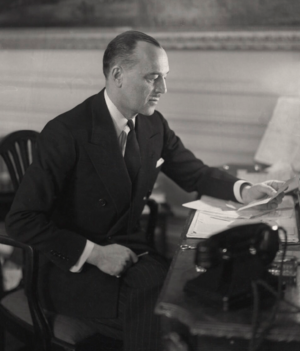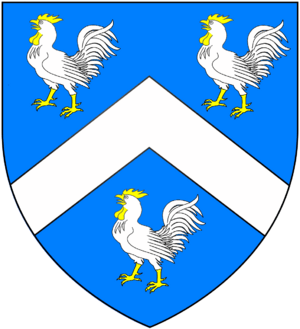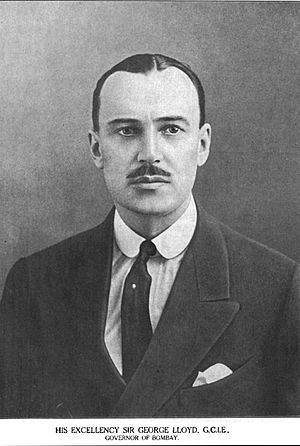George Lloyd, 1st Baron Lloyd facts for kids
Quick facts for kids
The Lord Lloyd
|
|
|---|---|
 |
|
| Leader of the House of Lords | |
| In office 22 December 1940 – 4 February 1941 |
|
| Monarch | George VI |
| Prime Minister | Winston Churchill |
| Preceded by | The Viscount Halifax |
| Succeeded by | The Lord Moyne |
| Secretary of State for the Colonies | |
| In office 12 May 1940 – 4 February 1941 |
|
| Monarch | George VI |
| Prime Minister | Winston Churchill |
| Preceded by | Malcolm MacDonald |
| Succeeded by | The Lord Moyne |
| High Commissioner in Egypt | |
| In office 1925–1929 |
|
| Monarch | George V |
| Preceded by | The Viscount Allenby |
| Succeeded by | Sir Percy Loraine, Bt |
| Governor of Bombay | |
| In office 16 December 1918 – 8 December 1923 |
|
| Monarch | George V |
| Preceded by | The Marquess of Willingdon |
| Succeeded by | Sir Leslie Orme Wilson |
| Member of the House of Lords Lord Temporal |
|
| In office 16 November 1925 – 4 February 1941 Hereditary Peerage |
|
| Preceded by | Peerage created |
| Succeeded by | The 2nd Lord Lloyd |
| Member of Parliament for Eastbourne |
|
| In office 29 October 1924 – 15 November 1925 |
|
| Preceded by | Rupert Gwynne |
| Succeeded by | Sir Reginald Hall |
| Member of Parliament for West Staffordshire |
|
| In office 10 February 1910 – 14 December 1918 |
|
| Preceded by | Henry McLaren |
| Succeeded by | constituency abolished |
| Personal details | |
| Born | 19 September 1879 Olton Hall |
| Died | 4 February 1941 (aged 61) Marylebone, London, England |
| Nationality | British |
| Political party | Conservative |
| Spouse |
Hon. Blanche Lascelles
(m. 1911) |
| Children | Alexander Lloyd, 2nd Baron Lloyd |
| Alma mater | |
George Ambrose Lloyd, 1st Baron Lloyd (born September 19, 1879 – died February 4, 1941) was an important British politician and administrator. He was a member of the Conservative Party. He held several key roles, including being a colonial administrator in different parts of the British Empire. From 1937 to 1941, he led the British Council, working to gain support for Britain during World War II.
Contents
Early Life and Career
Lloyd was born in Olton Hall, Warwickshire. His father, Sampson Samuel Lloyd, was also a Member of Parliament. George went to Eton and Trinity College, Cambridge. At Cambridge, he was a coxswain (the person who steers and directs the rowers) for the university's rowing team in the 1899 and 1900 Boat Races. He left college without finishing his degree and traveled to India.
In 1901, Lloyd joined his family's business, Stewarts & Lloyds, as a director. He became interested in tariff reform (a system of taxes on imported goods) in 1903, which was promoted by Joseph Chamberlain. In 1905, he decided to study the British Empire's influence in the East.
Working for the Foreign Office
Through his friends, Lloyd began working for the Foreign Office in Constantinople (now Istanbul) in 1906. He was an unpaid assistant. He explored the Baghdad Railway and wrote detailed reports on economic issues in the Ottoman Empire. This led to him being appointed to investigate trade in the Persian Gulf in 1907.
Becoming a Member of Parliament
Lloyd was inspired by Joseph Chamberlain's ideas to connect Britain and its dominions (self-governing countries within the British Empire) more closely. This led him to enter politics. In the January 1910 election, he was elected as a Liberal Unionist MP for West Staffordshire. He married Blanche Lascelles in 1911.
Before the First World War started, Lloyd and another MP, Leopold Amery, urged the Conservative leaders to declare war on Germany. In 1918, Lloyd co-wrote a book called The Great Opportunity with Edward Wood. This book suggested giving more power to local governments and improving British industry and farming.
Service in World War I
When Britain entered World War I, Lloyd joined the Warwickshire Yeomanry as a lieutenant. He served with Sir Ian Hamilton at Gallipoli and was part of a special British mission to Petrograd (Russia). He also visited Basra and worked with T. E. Lawrence in the Middle East. He reached the rank of captain and received the Distinguished Service Order for his service.
Colonial Administrator Roles
Governor of Bombay
In December 1918, Lloyd became the Governor of Bombay in India. One of his main projects was reclaiming land in Bombay for new housing. He also built the Lloyd Barrage (now Sukkur Barrage), a large irrigation system. These projects were funded by loans raised in India, which was a new approach at the time.
During his time as governor, there was growing Indian nationalist movement. In 1921, Lloyd insisted on the arrest of Mahatma Gandhi, a key leader of the independence movement. Gandhi was later imprisoned. Lloyd believed strongly in the British Empire and thought it was important to maintain British control. He finished his term in 1923 and was honored with the title of Privy Counsellor.
Lloyd also helped send the first Indian team of athletes to the 1920 Olympic Games in Antwerp, Belgium. He worked with Sir Dorabji Tata to form the Indian Olympic Association. He even arranged for the team's training and travel. He also supported the Bhandarkar Oriental Research Institute, which worked on a critical edition of the Hindu epic Mahabharata.
High Commissioner in Egypt
Lloyd returned to Parliament in 1924, representing Eastbourne. In 1925, he was made Baron Lloyd, a title named after his family's ancestral home in Wales. After this, he was appointed High Commissioner to Egypt. He served until 1929, when he resigned due to disagreements with the British Foreign Secretary, Arthur Henderson. Lloyd later wrote a two-volume book about his experiences in Egypt.
Political Activism
In the 1930s, Lloyd became president of the Navy League, which encouraged the government to spend more on the Royal Navy. He also joined the India Defence League, which opposed giving India self-rule. He worked with Winston Churchill against the government's plans for Indian Home Rule.
Lloyd was also wary of Adolf Hitler and the Nazi movement. He believed they were a threat to Britain and pushed for Britain to rebuild its military as early as 1930.
Leading the British Council
From 1937, Lloyd served as chairman of the British Council. This organization aimed to promote British culture and values around the world. He increased the number of lectureships and traveled to neutral countries to gather support for Britain during the early stages of World War II.
The British Council was officially independent, but it worked closely with the Foreign Office to promote Britain's image. Lloyd used his position to gather information and had special access to reports from MI6, the British intelligence service.
In 1937, Foreign Secretary Anthony Eden asked Lloyd to focus on improving Britain's image in countries like Portugal, Greece, Turkey, Yugoslavia, Romania, and Poland. Lloyd was particularly interested in the Balkans, which he saw as important for controlling the Near East. He suggested that Britain should increase its economic involvement in the Balkans to prevent Germany from gaining too much influence there.
Views on Czechoslovakia
Lloyd disagreed with the British government's approach to Czechoslovakia in 1938. He believed that Germany planned to invade Czechoslovakia. After the Munich Agreement, which allowed Germany to take parts of Czechoslovakia, Lloyd was critical of the decision.
Efforts in the United States
In 1938, Lloyd tried to increase British influence in the United States to encourage American involvement in European affairs. He suggested that British professors should lecture at American universities to strengthen ties. However, the American government passed a law requiring foreign propaganda to be registered, and there was concern about British attempts to influence American public opinion.
As a result, Britain adopted a "no propaganda" policy in the US until 1940. Lloyd then used a more informal approach. He arranged for influential Americans to visit Britain, where they met important British figures. These meetings aimed to highlight the shared values of freedom and democracy between the two countries. This way, the message was spread without being labeled as official propaganda.
Focus on the Balkans
After the Munich Agreement, Lloyd focused on getting more British support for Yugoslavia and Romania. He was especially involved with Romania, meeting with King Carol II. Lloyd urged Britain to buy Romanian oil and wheat and help build a naval base. He believed it was dangerous to let oil-rich Romania fall under German influence.
Despite Lloyd's efforts, Britain's economic support for Romania was limited. He also worked with Prince Paul, the Regent of Yugoslavia. Lloyd encouraged British businesses to buy products from the Balkans to counter German economic influence. He also visited Greece to improve Anglo-Greek relations and suggested that Greece's leader, General Ioannis Metaxas, should be replaced by someone more friendly to Britain.
World War II and the Balkans
In January 1939, Lloyd reported that Germany was planning to invade Poland. He played a key role in the "Tilea affair," where a Romanian diplomat claimed Germany was about to invade Romania. Lloyd supported this claim, even though Romania's foreign minister denied it.
Lloyd argued that Britain and France should work together in the Balkans to deter Germany. He was instrumental in securing guarantees of support for Romania and Greece from Britain and France in April 1939. He even influenced the French ambassador to ensure France would guarantee Romania, which then pushed Britain to do the same.
When Britain declared war on Germany in September 1939, Lloyd ensured that a pamphlet explaining Britain's reasons for war was translated and distributed throughout the Balkans. He also pushed for more funding for the British Council's work in the region. Lloyd and Churchill supported the idea of a "Balkan league" to block German expansion.
Balkan Tour
In October 1939, Lloyd began a tour of the Balkans to work towards a "Balkan pact." He visited Romania, Belgrade, and Sofia. However, his efforts were hindered because Britain could not supply the weapons that Yugoslavia and Bulgaria wanted. Also, Bulgaria's territorial claims made a neutral Balkan league difficult to achieve.
After his tour, Lloyd returned to Britain and supported French plans to open a "second front" in the Balkans by landing troops in Thessaloniki. He argued that showing strength would encourage Italy to remain neutral. However, the British government was hesitant.
In Cabinet
When Winston Churchill became Prime Minister in May 1940, he appointed Lloyd as Secretary of State for the Colonies. In December, Lloyd also became Leader of the House of Lords.
London Central Mosque
Lord Lloyd was a strong supporter of building the London Central Mosque. He believed that London, with many Muslims, should have a central place of worship for them. He thought that gifting a site for the mosque would show respect to Muslims in the British Empire and improve relations with Arab countries.
Other Interests
Lloyd was also a director of the British South Africa Company. He enjoyed traveling to tropical countries. In his fifties, he learned to fly and earned a civil pilot's certificate in 1934. In 1937, he became an Honorary Air Commodore for No 600 (City of London) (Fighter) Squadron of the Auxiliary Air Force, and he even trained to become a military pilot.
Personal Life
In 1911, Lloyd married Blanche Isabella Lascelles. She was a lady-in-waiting (an assistant) to Alexandra of Denmark and later to Mary, Princess Royal and Countess of Harewood.
Death
Lloyd passed away from myeloid leukaemia (a type of cancer) in London in February 1941, at the age of 61. He was buried in St Ippolyts, Hertfordshire. His son, Alexander, inherited his title. Lady Lloyd died in 1969.
See also
- List of Cambridge University Boat Race crews
|
 | Jackie Robinson |
 | Jack Johnson |
 | Althea Gibson |
 | Arthur Ashe |
 | Muhammad Ali |



